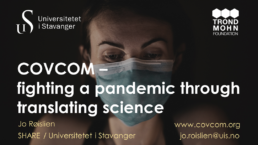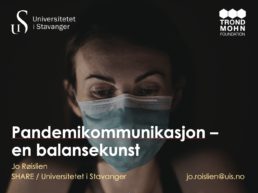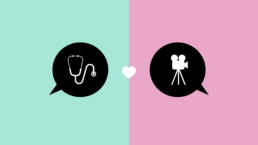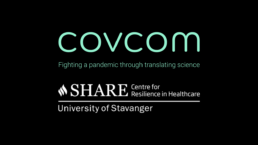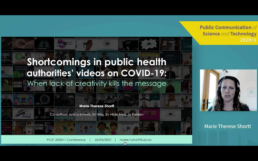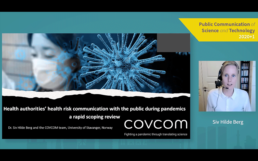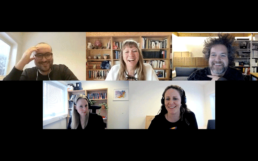Røislien presents the COVCOM project at the Research Council of Norway conference
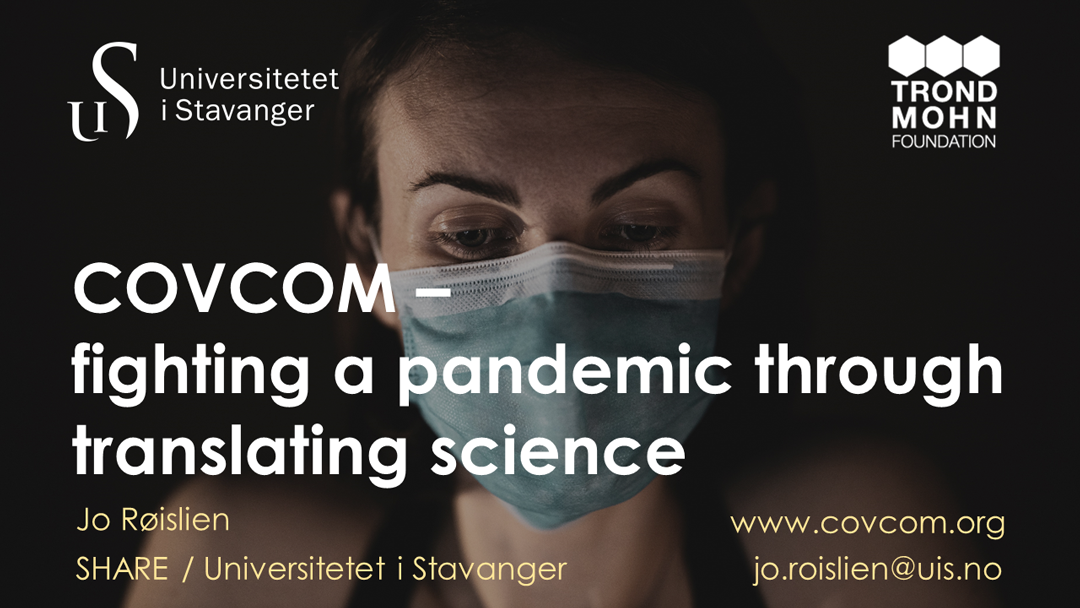
COVCOM was part of a select few projects presented at the COVID-19: Research in the wake of the pandemic final conference.
Full conference details: https://mohnfoundation.no/seminarserien-research-in-the-wake-of-the-pandemic/
Røislien presented results from the COVCOM project at the Norwegian Academy of Science and Letters
https://www.youtube.com/watch?v=36EwukXDyqU
Video of the presentation (in Norwegian).
Postdoctor Siv Hilde Berg presents COVCOM at Citizen Science Seminar
Methods and experiences from the COVCOM project are relevant to the field of Citizen Science. Citizen Science is the involvement of the public in scientific research in various ways. Berg presented: Involving the public and experts in creating pandemic health communication at the Citizen Science seminar at the University of Stavanger 6 December 2021.
COVCOM Team Present at International Symposium for Early Career Research in Quality and Safety in Healthcare
Marie Therese Shortt, Daniel Adrian Lungu and Siv Hilde Berg presents COVCOM at the Pandemic responses session at the International Symposium for Early Career Research in Quality and Safety in Healthcare.
The symposium was held 23-24 November 2021 organized by SHARE - Centre for Resilience in Healthcare at the University of Stavanger.
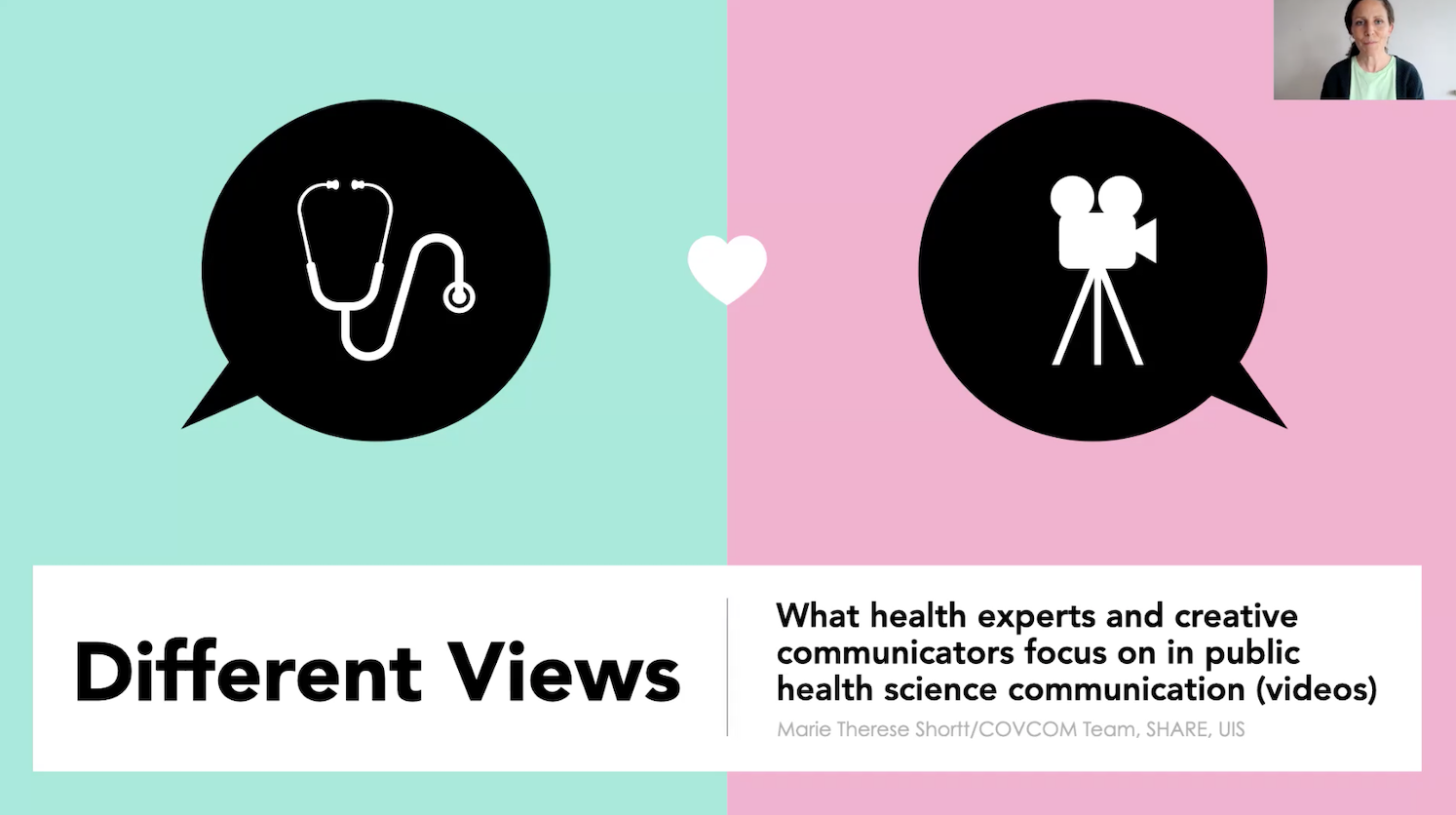 Marie Therese presented results from a qualitative study ‘Different views: What health experts and creative communicators focus on in public health science communication (videos)’.
Marie Therese presented results from a qualitative study ‘Different views: What health experts and creative communicators focus on in public health science communication (videos)’.
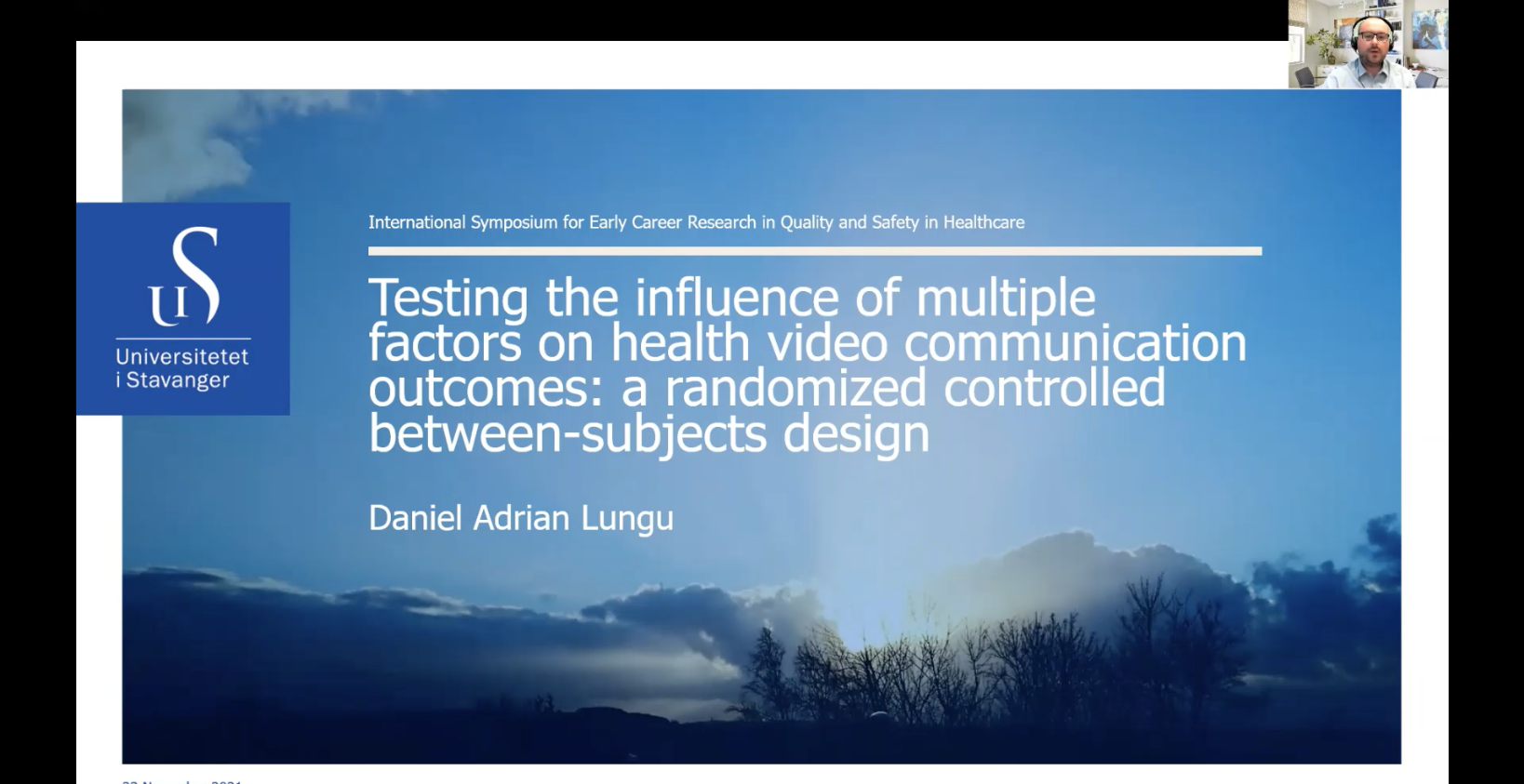 Daniel Adrian Lungu presented a methodological framework ‘Testing the influence of multiple factors on health video communication outcomes: a randomized controlled between-subjects design’.
Daniel Adrian Lungu presented a methodological framework ‘Testing the influence of multiple factors on health video communication outcomes: a randomized controlled between-subjects design’.
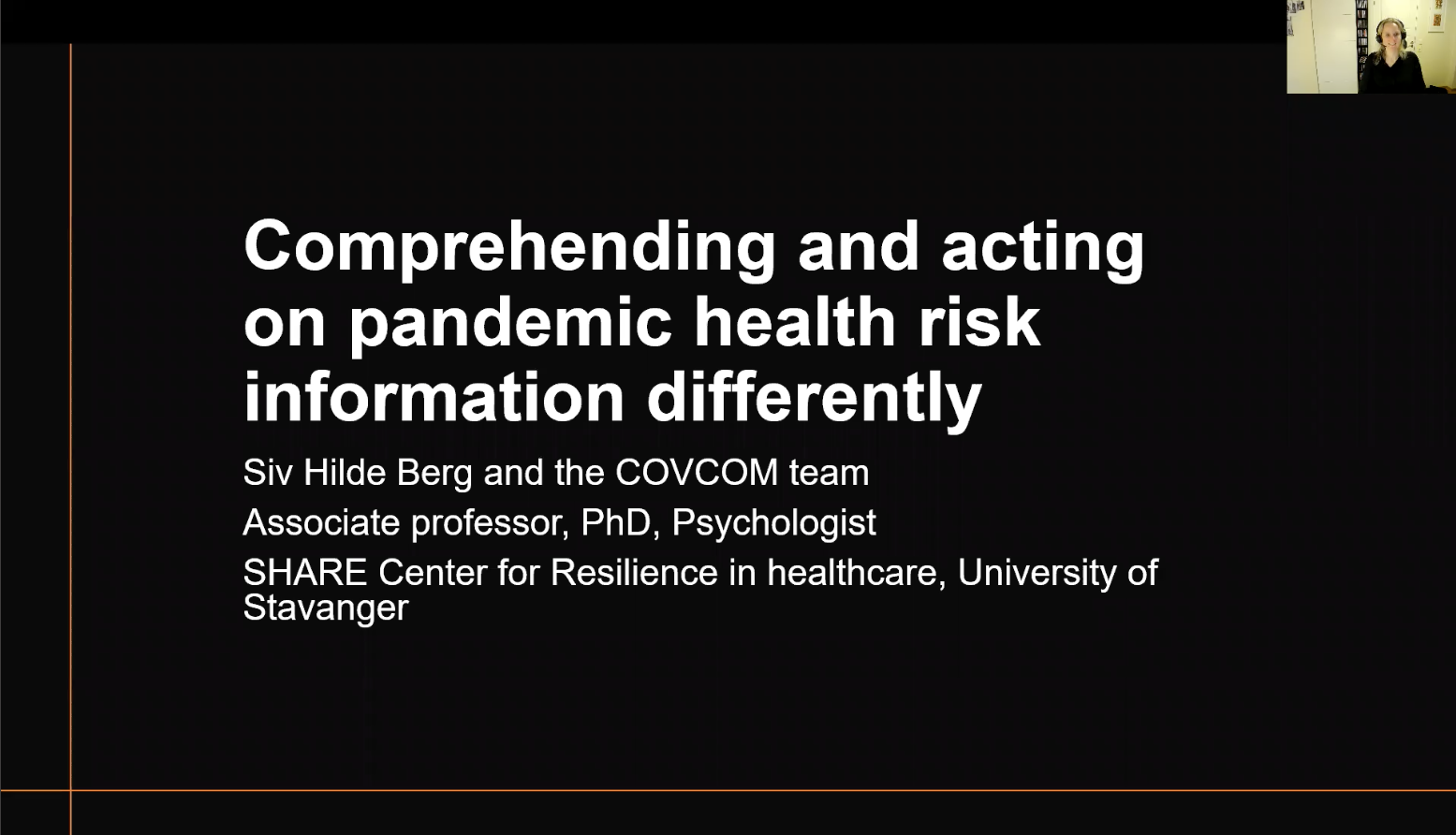 Siv Hilde Berg presented results from a qualitative study: ‘Comprehending and acting on pandemic health risk information differently’.
Siv Hilde Berg presented results from a qualitative study: ‘Comprehending and acting on pandemic health risk information differently’.
Røislien presents COVCOM at Stiftelsen Norsk Luftambulanse
Project leader Jo Røislien presented the COVCOM project and research results to the marketing department at Stiftelsen Norsk Luftambulanse on the 27th Oktober. He discussed the challenge in reaching out with important health information on a large scale during high risk situations when time is of the essence.
Røislien presents the COVCOM project at Data-SKUP Conference
Project leader Jo Røislien presented the COVCOM project and recent research findings from the project at the Data-SKUP ("Stiftelsen for en Kritisk og Undersøkende Presse”) conference. https://www.skup.no/2021/07/de-kommer-pa-data-skup-16-oktober
Røislien presents COVCOM at Healthy Choices seminar (UiT)
On 21st Septmeber project leader Jo Røislien presented the COVCOM project at the University of Tromsø for the Healthy Choices seminar. The Healthy Choices project have received considerable funding to carry out research in science communication. The COVCOM project will be used as inspiration for one of the scholarship projects in workpackage 5 of the Healthy Choices project "WP 5 Healthy choices and novel science communication"
Healthy Choices: https://uit.no/research/choices
Shortt presents at PCST 2020+1 Conference
On 26th May 2021, our Postdoc Marie Therese Shortt presented insights from 'Shortcomings in public health authorities' videos on COVID-19: When lack of creativity kills the message' at the Public Communication of Science and Technology Conference 2020+1.
The programme for the session
Theme: Science communication, COVID and controversies (Session H: 15:15-16:30 BST)
Chair: Jan Riise
| Public Perception, Myths, and Communication in Turkey During COVID-19 Pandemic | Sevinc Gelmez-Burakgazi | Turkey |
| Enabling decision-relevant debates about human genome editing | Nicole Krause | United States |
| Shortcomings in public health authorities' videos on COVID-19: When lack of creativity kills the message | Marie Therese Shortt | Norway |
| Public engagement with Science among Religious Minorities: Lessons from COVID-19 |
Abstract and information
Individual paper
Shortcomings in public health authorities' videos on COVID-19: When lack of creativity kills the message
Author: Marie Therese Shortt
University of Stavanger, Norway
Video communication has played a key role in relaying important and complex information on the COVID-19 pandemic to the general public. The aim of the study was to compare videos on COVID-19 published by Norwegian Health Authorities, WHO and on YouTube as a first step towards identifying whether videos by health authorities measure up to contemporary creative practices and video consumer behaviour on YouTube. Through structured search on YouTube, we found that Norwegian health authorities have published 26 (unique) videos to relay information on COVID-19, and the WHO, of which Norway is a member, a total of 29 videos. Press conferences, live videos and interviews by external media outlets were not included. A content analysis comparing these 55 videos to the 27 most viewed videos on COVID-19 on YouTube in video and channel data, video category, and creative presentation means, demonstrates a wide creative gap between videos created by the healthcare authorities and contemporary practices utilised in the creative media industry. Health authorities and WHO’s COVID-19 videos appear out of sync with popular online culture. A more reflective approach to creative communication can help increase the uptake, recall and reach of audio-visual communication on pandemics by public healthcare authorities. The study suggests future research areas to grow the evidence relating to creative choices and how they impact reach, viewers’ behaviour and trust.
Co-authors: Ionica Smeets
Leiden University, Netherlands
Siri Wiig
Siv Hilde Berg
Jo Røislien
Centre for Resilience in Healthcare, Faculty of Health Sciences, University of Stavanger, Norway
Berg presents at PCST 2020+1 Conference
On 24th May 2021, our Postdoc Siv Hilde Berg presented insights from her paper 'Health authorities' health risk communication with the public during pandemics: a rapid scoping review' at the Public Communication of Science and Technology Conference 2020+1.
The programme for the session
Theme: Science communication & COVID (Session A: 13:45 – 15:00 BST)
Chair: Ana Claudia Nepote
| Public understanding of the mathematical aspects of the COVID-19 pandemic | Ayelet Baram-Tsabari | Israel |
| Health authorities' health risk communication with the public during pandemics: a rapid scoping review | Siv Hilde Berg | Norway |
| Rapid reaction: Science Media Center Germany and its response to the COVID-19 outbreak | Irene Broer | Germany |
| How citizens make sense of Covid-19 and the practice of communicating science | Frank Kupper | Netherlands |
| Narrative analysis about facemask wearing at the COVID-19 time: perceptions of a basic tool with significant socio-cultural implications | Lucia Martinelli | Italy |
Abstract and information
Individual paper
Health authorities' health risk communication with the public during pandemics: a rapid scoping review
Author: Siv Hilde Berg
Centre for Resilience in Healthcare, Faculty of Health Sciences, University of Stavanger, Norway
Background: Scientific insights from the H1N1 Swine flu pandemic and the recent coronavirus pandemic COVID-19 provide an opportunity to get insight into the role of health authorities" various ways of communicating health risk information to the public. Hence, we aimed to synthesise the existing evidence regarding different modes of communication used by health authorities in health risk communication with the public during a pandemic.
Methods: We conducted a rapid scoping review. MEDLINE and EMBASE were searched for publications in English from January 2009- through October 2020, covering both the H1N1 pandemic as well as the response phase during the COVID-19 pandemic.
Results:The search resulted in 1440 records, of which 48 studies met our eligibility criteria. The included studies were analysed in a content analysis.
Conclusion: The identified studies on social media focused mainly on engagement. There is a lack of studies investigating the effect of health authorities" videos and messages on social media platforms and self-protective behaviour. More studies with RCT design are needed across the fields of health risk communication and media studies (including visual communication, creative communication, video, digital marketing) at a time when online digital communication is central in reaching the public.
Co-authors:
Jane O'Hara
School of Healthcare, Faculty of Medicine & Health, University of Leeds, UK., United Kingdom
Henriette Thune
Faculty of Health Sciences, University of Stavanger, Norway, Norway
Siri Wiig
Marie Therese Shortt
Kolbjørn K. Brønnick
Centre for Resilience in Healthcare, Faculty of Health Sciences, University of Stavanger, Norway
https://www.abdn.ac.uk/events/conferences/pcst/
COVCOM workshop at Trust Me! Conference
On March 9th 2021 the COVCOM team hosted a 90minute workshop at the Trust Me! Conference by Linnaus University. The workshop consisted of four presentations followed by a discussion with the audience. Workshop title and description were as follows:
‘COVCOM - Fighting a pandemic through translating science’ – when coming across with the message means life or death.
Henriette Thune, Jo Røislien, Marie Therese Shortt, Siv Hilde Berg, Daniel Lungu
SHARE – Centre for Resilience in Healthcare, University of Stavanger, Norway
The idea of this workshop is to discuss challenges and advantages in initiating an inter-disciplinary project about effective science communication in the middle of a pandemic, when concepts such as trust, thruthfulness and credibility implicitly are at stake. The emergency CFP came from the Norwegian Research Council early March 2020, funding was confirmed end June and three postdocs started fall 2020. The ‘Trust Me!’ conference is an excellent opportunity for us to discuss work in progress with competent researchers and experts within fields differing from most of our backgrounds. We will give four short introductions: Jo Røislien: ‘COVCOM - Fighting a pandemic through translating science’, Henriette Thune & Marie Therese Shortt: ‘Health, Risk, Science, Media – the situated positions of the researcher and the communicator in meaning production’, Siv Hilde Berg: ‘Tailoring the health risk communication message by using the mental models approach’ and Daniel Adrian Lungu: ‘How to perform randomized controlled trials on the effect of targeted health communication?’, followed by discussion with the workshop participants.
Keywords: Science communication, qualitative, creative, RCT (randomized controlled trial), COVID-19
Short bio of the presenters: Project manager and WP2 lead Jo Røislien is professor of medical statistics, an award-winning science communicator who has written, hosted and produced several science TV series (NRK, Discovery Channel), short and feature films. WP1 lead Henriette Thune is dean of research at the Faculty of Health Sciences with a PhD on how meaning is produced through aesthetic representations. Her focus is on qualitative methodology in the cross-section between health and humanities. Postdoctor Marie Therese Shortt is a multimedia designer & lecturer, with PhD in visualising cross-cultural communication. Postdoctor Siv Hilde Berg is a psychologist and safety scientist with a PhD in health and medicine. Postdoctor Daniel Adrian Lungu is a health management researcher focused on improving the performance of healthcare organisations.

